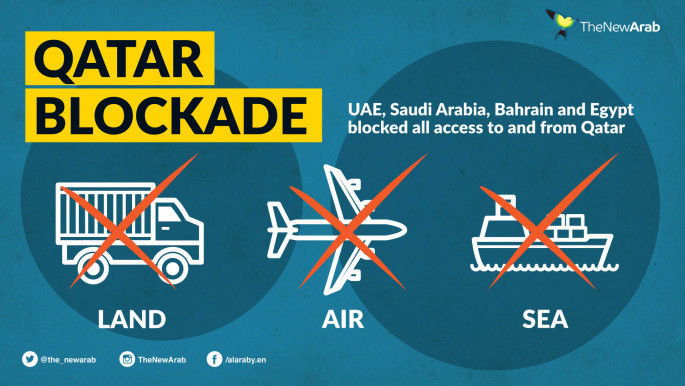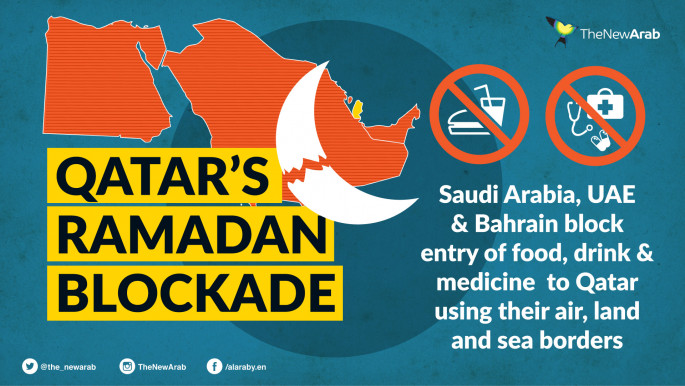Qatar remains defiant as Saudi-UAE ultimatum is rejected
The past month has seen a remarkable change of fortunes for the tiny Gulf state, reports Paul McLoughlin.
5 min read
Doha has won friends across the region [Anadolu]
After undergoing a punishing month-long blockade at the hands of its Gulf neighbours, Qatar appears more confident than ever as it rejects a set of "unreasonable" demands issued by the Saudi-led anti-Doha coalition.
As the clock ticked down on Tuesday towards the midnight deadline, Qatar Foreign Minister Sheikh Mohammed bin Abdulrahman al-Thani sent a defiant message to the Saudi-led coalition, saying Doha would only comply with what was "within its hands".
Qatar will therefore work harder to clamp down on "terror funding" from among its citizens, but Riyadh's allegations that Doha was directly funding al-Qaeda and the Islamic State group were categorically false, said al-Thani, and so inactionable.
"It's not about terrorism, it's talking about shutting down the freedom of speech," the foreign minister told reporters.
Among the demands made by Saudi Arabia, the UAE, Bahrain and Egypt, was that Qatar closes popular pan-Arab news network Al Jazeera as well as The New Arab, shut down a Turkish military base and cut ties with Iran.
"The state of Qatar has adopted a very constructive attitude since the beginning of the crisis. We are trying to act mature and discuss the matter," al-Thani continued.
Last week, the Qatari foreign minister said the list of demands "was made to be rejected".
Twists and turns
The Gulf crisis began when Qatar was accused of a litany of "crimes", all of which were swifly denied by Doha.
The situation escalated into a blockade of Qatar, cutting Doha off from food supplies. It has since diversified its suppliers, importing Turkish, Omani, Indian, Iranian and Somali food stuffs.
Qatar was then given a ten-day period to "change its behaviour", followed by an 48-hour extension.
Although its been a rocky month for Doha, it has come out stronger - and with much of the world's sympathy in hand.
As the clock ticked down on Tuesday towards the midnight deadline, Qatar Foreign Minister Sheikh Mohammed bin Abdulrahman al-Thani sent a defiant message to the Saudi-led coalition, saying Doha would only comply with what was "within its hands".
Qatar will therefore work harder to clamp down on "terror funding" from among its citizens, but Riyadh's allegations that Doha was directly funding al-Qaeda and the Islamic State group were categorically false, said al-Thani, and so inactionable.
"It's not about terrorism, it's talking about shutting down the freedom of speech," the foreign minister told reporters.
Among the demands made by Saudi Arabia, the UAE, Bahrain and Egypt, was that Qatar closes popular pan-Arab news network Al Jazeera as well as The New Arab, shut down a Turkish military base and cut ties with Iran.
"The state of Qatar has adopted a very constructive attitude since the beginning of the crisis. We are trying to act mature and discuss the matter," al-Thani continued.
Last week, the Qatari foreign minister said the list of demands "was made to be rejected".
 |
|
| [Click to enlarge] |
Twists and turns
The Gulf crisis began when Qatar was accused of a litany of "crimes", all of which were swifly denied by Doha.
The situation escalated into a blockade of Qatar, cutting Doha off from food supplies. It has since diversified its suppliers, importing Turkish, Omani, Indian, Iranian and Somali food stuffs.
Qatar was then given a ten-day period to "change its behaviour", followed by an 48-hour extension.
Although its been a rocky month for Doha, it has come out stronger - and with much of the world's sympathy in hand.
Many of Saudi Arabia and the UAE's most staunch allies plunged into the blockade and media war with gusto, other partners such as Jordan, Somalia and Morocco have been more guarded than Riyadh probably hoped.
Add to this the condemnation of the blockade by Turkey, the UN, EU members, human rights groups, and even the US government - despite President Donald Trump's vocal Twitter support for Saudi Arabia. The game plan of the anti-Qatar bloc looks to have backfired.
The Gulf camp now seems to be the isolated party, not Qatar.
There has been no word from Saudi Arabia or the UAE of any possible consequences for Qatar's formal rejection of their the demands, but it is widely believed that Doha could be expelled from the GCC or Arab League.
With the blockade still in full force and diplomatic relations cut with Qatar, there appears little else the anti-Doha camp can do - short of a monumentally foolish military campaign.
Moving forward
Qatar has argued that some of the demands, such as closing Al Jazeera, The New Arab and a Turkish military base, infringe on the emirate's sovereignty.
Others, it says, are patently untrue, such as allegations that Iranian troops are present in Doha or that Qatar supports the Islamic State group.
Doha has portrayed itself as the bullied, smaller party, being pushed around by its larger neighbours.
"We believe the world is governed by international laws that don't allow big countries to bully small countries... there is international law that should not be violated and there is a border that should not be crossed," the Qatari foreign minister said this weekend in Rome.
 |
We believe the world is governed by international laws that don't allow big countries to bully small countries. - Qatar Foreign Minister Sheikh Mohammed bin Abdulrahman al-Thani |
 |
The dog-eat-dog world that Qatar has portrayed in the Gulf might alarm Western powers seeking stability in the region, as the war against IS grinds down.
Most of the leading world powers appear to agree, and even President Vladimir Putin - who has kept Russia out of intra-GCC relations - is now getting involved.
Putin was said to have voiced support for a diplomatic solution to the crisis and for diplomatic relations between Gulf states to be normalised as soon as possible.
 |
|
| [Click to enlarge] |
Divisions
Another regional power, Turkey, has backed Qatar throughout the conflict.
President Recep Tayyip Erdogan re-iterated Turkey's support for Doha by meeting Qatari Defence Minister Khaled bin Mohammed al-Attiyah on Saturday.
Turkey and Qatar appear intent on ending the blockade rather than looking merely to limit any potential new punishments dished out on Doha.
"There are some indications that a solution is possible. This is our general impression. We need to continue efforts to take measures that go in the right direction," said presidential spokesperson Ibrahim Kalin said.
Turkey has avoided directly attacking any of the aggressive Gulf states, but its diplomatic support for Qatar has been evident.
The blockade has led to the opposite of what Gulf states hoped for. Rather than being isolated, Doha has been forced into diversifying its trading partnerships. Iran, Iraq and India are among the states that have boosted relations with Qatar during the blockade.
Meanwhile, the two Gulf states that have acted as peacemakers - Kuwait and Oman - also appear to have brushed off potential pressure from Saudi Arabia and the UAE to fall in line.
Rather than building a powerful GCC consensus around isolating Qatar, the Gulf bloc now looks more divided than ever.
Long-term strategies and hopes of a pan-Gulf railway being built, a common GCC currency, and unified army command are meanwhile vanishing in the sand.
Follow Paul McLoughlin on Twitter: @PaullMcloughlin





 Follow the Middle East's top stories in English at The New Arab on Google News
Follow the Middle East's top stories in English at The New Arab on Google News


